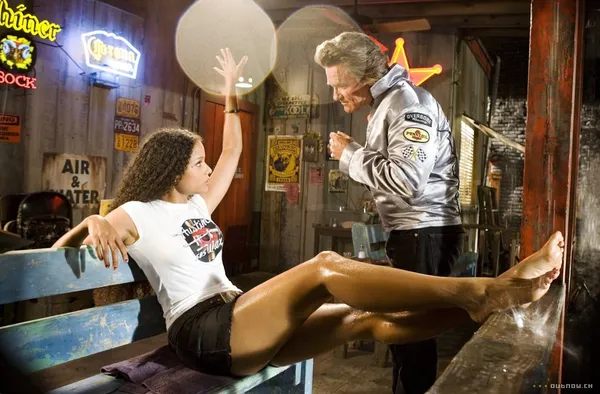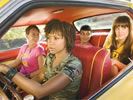Eye For Film >> Movies >> Death Proof (2007) Film Review

Before anyone thinks that my five star rating is to suggest everyone should like this film, let me correct any misapprehension: I predict it will divide even Tarantino fans more than any of his earlier films.
Death Proof has the dubious distinction of appearing to be a real low-brainer. But apart from the clever use of 'retro' cinema techniques it also boasts insightful dialogue and a storyline that resounds on multiple levels. This becomes more apparent with repeated viewing.

Here's some of the things I like about it:
As a straightforward adrenalin rush, it hits all the right spots. Stunts are (very pointedly) real, not faked or CGI'd. One of the main stars, Zoe Bell, is a real-life stuntwoman and skilled in martial arts. Car chases are really at 90mph. A head-on smash is replayed from several angles. Performances are gutsy.
The dialogue has many fascinating sections where I want to hear it again and again for the sheer enjoyment. DJ Jungle Julia (Sydney Tamiia Poitier) engineers a clever word-game for which her friend 'Butterfly' (Vanessa Ferlito) is the recipient, complete with get-out options if she doesn't fancy the guys who might play it. Even the description of a man she might fancy has a hip repeatability that makes you strain to catch the exact wording (it is repeated, but, again, at breakneck speed). When Stuntman Mike (Kurt Russell) outsmarts the girls, he pulls a psychological stunt based on the phrase "all right in my book". These are girls used to running rings round guys in order to get free drinks. Stuntman Mike ups the ante. (Tarantino actually studied how the girls talked off camera and built on it to re-create memorable interactions.)
The first time I saw Death Proof I found the all-girl bitching/scheming tiresome. It can make the first half hour seem never-ending. I almost felt Tarantino had lost it. But this had the effect of lulling me into a state where the sudden terror in Act Two (as Stuntman Mike gives a girl a lift in his death-proof car) was all the more scary. In retrospect, the girl-talk is fascinating. And on second viewing I listened carefully to every word. There were shades of meaning that added to the story.
Girls in the second half of Death Proof use similar female-bonding chatter, but are really modern women with a variety of attitudes towards men. An argument over guns is particularly interesting. One girl argues that people who carry guns are more likely to get shot. Pepper spray is a better protection, she says. Her gun-toting friend retorts that, if someone is trying to rape her, she wants to waste him, not "give him a rash". These allusions to rape are continued as serial killer Mike uses them as a metaphor for killing his quarry. The girls employ similar imagery when exacting revenge. When used in the context of the frequent Vanishing Point references, they might even suggest the rape of the individual by a power-hungry society.
Something else I like about Death Proof is the cinephile references. These go far beyond the simplistic I Spy of films such as Scream (a car, at one point, drives through a noticeboard for Scary Movie 4). They are complex allusions that encourage study of cinema and, in return, enhance enjoyment of Death Proof. I had never seen Vanishing Point until I caught Tarantino's enthusiasm for it in this film. Bell frequently talks about it. Kowalski (from Vanishing Point) is her hero. She has gone to great lengths to find an original 1970 white Dodge Challenger, as used in Vanishing Point, to test drive. (This car, and the earlier film, feature very prominently.) Car chases in the two films have striking parallels. Both can be unashamedly symbolic, but the heroine of Death Proof (unlike Kowalski) refuses to be beaten.
Perhaps more convincing to me than the highbrow/lowbrow analysis of why I liked the movie is the fact that I watched it four times in as many weeks. There are few films I can enjoy like that. Even classics that I re-watch every year would bore me if I saw them several times in quick succession.
Death Proof is the story of a serial killer who uses a stunt car to murder women. There have been accusations of misogyny. At a Glasgow preview screening, a protest was mounted by Scottish Woman Against Pornography. If Death Proof encourages misogynist attitudes that would be a serious issue which needs to be addressed.
Women in peril is a long-running theme in cinema. Feminists may rightly complain about the one-sidedness of female stereotypes. How many films have a woman coming to the rescue of a helpless man? But filmmakers may claim that they simply present stories based on popular culture. And many women I know still enjoy the idea of a knight in shining armour who comes to the rescue. It is an idea deeply embedded in society. Death Proof, on the other hand, has a woman (Bell) 'rescuing' both herself and her female companions from a psycho male.
She even takes the symbolic George and the Dragon posture near the end, straddling an open window with a raised, lance-like iron pipe in her hand. The squealing of the trapped girl in the first half of the film is mirrored by the squealing of a trapped man in the second half. It may even be read as having more to do with a (gender neutral) re-working of the American Hero archetype. Check out the pervasive references to Vanishing Point (In that film, the hero Kowalski is chased and victimised by a psychotic 'system'. Death Proof's heroine, on the other hand, is chased and victimised by a psycho killer but refuses to lie down and die. She eventually leads the charge for revenge.)
Film academic Susan Hayward comments on the "vicious normalising of misogyny" in films such as Psycho and later slasher movies. (Tarantino has compared Death Proof to a slasher film.) A psychological analysis compares these movies to vampire films originating in a bourgeois society that has become aware of a concealed dependency on the working class. It is the dependence of the stronger on the weaker. In gender terms, it is male dependency on the female for his subjectivity (the Death Proof psycho-killer relies on his victims for sexual fantasy). In an irrational response to fear, the stronger (man/vampire/ruling class) then tries to kill the weaker, before that dependency is uncovered. In Freudian terms, the phallic substitutes (traditionally knives, but in this case a car) are used to 're-castrate' the phallic woman.
Hayward argues that slasher movies can be interpreted as a backlash against early 1970s feminist movements. Modern feminist Janet Radcliffe Richards has also argued that many early feminist diatribes merely foment an endless cycle of warring between the sexes and should be abandoned. But to many that will not address the basic 'problem' that films such as Silence Of The Lambs or Death Proof may make women feel particularly vulnerable and uncomfortable. One viewer said she "felt raped" after seeing the film. But it begs the question: should you go to see a scary movie if you do not want to be scared?
Jean-Luc Godard once said that the only way to review a movie is to make another movie. My colleague Scott Macdonald has even suggested that all of Tarantino's films so far are a 'comment' on the genres to which they relate. Death Proof highlights old-versus-new in many ways. The visual techniques (such as scratched film, or jump-cuts that imitate repaired film) and retro sets make us consider the old Grindhouse days of movie-making. Russell's character is an old-school stuntman. His career focussed on "the old days before CGI". Bell, playing herself in the second half, is new-school stuntwoman. As a star of Death Proof, she is a new celebrity who does her own stunts.
Death Proof, like earlier Tarantino films, includes much seemingly gratuitous and extreme violence. But, unlike most of the grindhouse movies to which it nominally pays homage, the violence has a Brechtian quality that makes us observe our own reactions. Stuntman Mike seems to give a sign directly to the audience before he terrorises his first victim. As in Reservoir Dogs, the violence is so stylised that we are reminded it is for entertainment rather than realism. This is perhaps one of the reasons why it (probably unfairly) arouses so much controversy - compared to run-of-the-mill films that contain equal but unremarked violence. It is likewise difficult to imagine people going out of the cinema and attempting the difficult 'ship's mast' stunts, or paying $10,000 to 'death-proof' a car in order to turn it into a killing machine. Copycat violence - misogynist or otherwise - hardly seems an issue.
Death Proof reapplies several Tarantino trademarks in true auteur fashion. The foot fetish scenes are more prominent than in his earlier films. A particularly nonchalant (barefoot) pose becomes iconic. A woman reclines with her feet up, ankles crossed. The opening scene has Jungle Julia's posture reflected in a filmic still on the wall above her. This posture is repeated several times with bare feet hanging out of open car windows. By the end of the film, the psychotic male has been brought to his knees by women. He lies at their feet - literally and symbolically. Bold use of forgotten pop hits, chronological reshuffling, pop-culture dialogue and violence-as-comedy all feature strongly, as in Tarantino's earlier work.
I hope I have given you some idea of the richness of a movie that will attract both praise and scorn. It is not an easy film. It recreates the look of flea-pit, B-movie grindhouse films, referencing their stereotypes and paying homage without being a grindhouse film itself. The timeline can be more difficult than some audiences will be comfortable with. The first half, shot to look like an old movie, is set only 14 months before the second half, clearly in the near present. It has a surface vacuity. But a vast amount of detail is crammed in visually and within the dialogue and repays repeated viewing amply. Its minimalist storyline, and its excellence in portraying realistic car chases and smashes, make it a temptingly iconic benchmark as well as a cult movie. It just might not be the kind of cult movie you expect.
Reviewed on: 17 Sep 2007


















